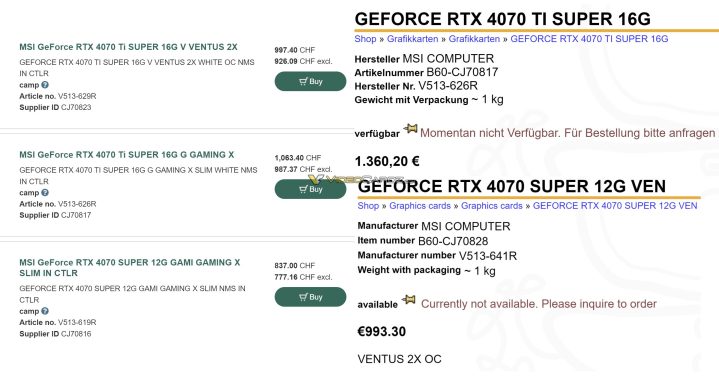The leaks on Nvidia’s new Super GPUs are getting out of hand. The slow drip of information has been steady for many months, leaving very few details on the cards when they actually get announced.
We’re talking about the RTX 4080 Super, RTX 4070 Ti Super, and RTX 4070 Super, which will be the first three models in the lineup. Thanks to various retailers and distributors all around the globe, we already have a substantial amount of information about the upcoming GPUs. The information might not all be perfect, but it paints a pretty clear picture of what these cards will be like.
ho-ho- pic.twitter.com/i13OUuPhBh
— 188号 (@momomo_us) December 25, 2023
The RTX 4080 Super is expected to feature a modest speed increase to 23Gbps for its 16GB GDDR6X memory. This will result in a 2.6% boost in bandwidth, achieving 736GB/s across the 256-bit memory bus. On the other hand, the RTX 4070Ti/4070 Super will continue to utilize a 21Gbps memory speed.
The clock speeds will also see minor adjustments, with the RTX 4080 Super moving from 2205/2505 MHz (base/boost) to 2295/2550 MHz compared to the non-Super version. The RTX 4070 Ti Super and RTX 4070 Super are expected to maintain identical boost clocks to the original models (2610 MHz and 2475 MHz, respectively). There is only a minor change to the base clocks, now registering at 2340MHz and 1980MHz.

Power consumption or TDP specifications are said to be 320W for the RTX 4080 Super, 285W for the RTX 4070Ti Super, and 220W for the RTX 4070 Super. Essentially, only the RTX 4070 Super will experience a small 20W increase in power consumption. The 12VHPWR power connector makes a comeback, but sadly, none of the leaked custom models are powered by standard connectors, meaning that Nvidia might be forcing its partners to utilize the high-power connector.
All of the specifications mentioned above are based on leaks and speculations, so things could obviously change or be wrong.
Notably, various RTX 40 Super series GPU models from popular board partners, including Asus, Gigabyte, and MSI, have been spotted online. MSI is expected to bring at least 12 new models, four from each SKU. There was also a recent leak where the Asus RTX 4070 Super Dual OC Edition was spotted by @momomo_us on X/Twitter.

More recently, Aorus (Gigabyte’s gaming division) released a teaser for an upcoming GPU that will be showcased at CES. While we cannot decipher which GPU is in the teaser picture, it seems to be similar to Gigabyte’s Aorus Master series featuring ‘Windforce bionic shark’ fans and an RGB ring around each fan.
The teaser comes just a day after an EEC filing revealed Gigabyte’s entire inventory of upcoming GeForce RTX 40 Super GPUs. The company is expected to go all-in with a minimum of 10 RTX 4080 Super, 11 GeForce RTX 4070 Ti Super, and 12 GeForce RTX 4070 Super cards.
Nvidia is scheduled to deliver a special address on January 8 — and although the invite doesn’t mention what will be announced — it’s pretty clear what’s coming.
Judging by the various leaks and hints in the past few months, the RTX 40 Super-series will debut in January 2024. While this might be disappointing for enthusiasts hoping for an early RTX 50 series release, it is good news for those who took the wise decision of not buying an RTX 40-series GPU. It is also interesting as we haven’t seen a Super refresh ever since the RTX 20-series.
Of course, actual performance is still central, and that’s really all that’s left to know about these new cards. Nvidia is bound to make some claims about performance, but it won’t be until independent reviews come out that we know exactly how powerful they really are.




